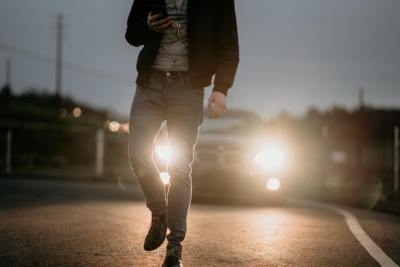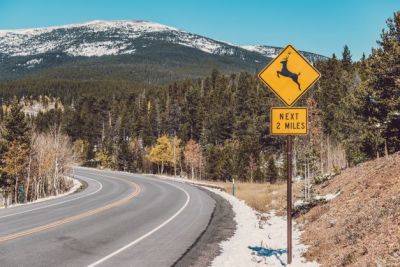From October to December, you may see a lot more deer crossing the roads. And with more deer, the chances of accidentally hitting one increases. Find out what happens with your car insurance if you hit a deer this season as we share steps to take and tips for helping to avoid deer-related accidents.
What insurance covers accidents with deer and other wild animals?
There are two scenarios for how your car insurance could cover a run-in with a deer. First, if you crash into deer, comprehensive coverage would be needed for any damages to your vehicle. Comprehensive auto policies are for non-collision accidents such as theft, hail damage, fire and more.
However, collision coverage can come into play if you swerve to the miss the deer and end up crashing into another vehicle, a ditch or a tree. This is not a comprehensive event because the damage was not actually caused by a deer impacting with your vehicle.
Liability insurance will not be enough in these scenarios to cover repairs to your own vehicle. It would only apply to the damages to another party’s property or injuries.

What should I do after hitting a deer?
HomeFirst® wants you to stay safe, so if you do hit a deer, please pull over, put on your hazard lights and check if anyone in the car needs medical assistance. Call an ambulance immediately for emergencies.
Be careful getting out of your vehicle, especially if other cars are around. Do not approach the animal if it has been wounded. You don’t want to be injured by a panicked deer’s hooves or antlers. Once you are calm and safe, you can call your local wildlife service and let them take care of the animal. If the animal did not survive, contact animal control to remove it.
Check your car thoroughly to see if it is safe to drive or if you need to call a tow truck. Before you drive away or have your vehicle towed, take photos of the scene and the damage. You will need these later for your insurance claim.
Usually, depending on your state’s laws, you are not required to file a police report if you hit a deer, but it’s a good idea to call the police and let them know if there is any obstruction to traffic. A police report on record could also come in handy later when filing a claim with your insurance.
Finally, let your insurance agent know as soon as possible about your accident. They will be able to answer your questions about deductibles, claim processing and more.

How can I prevent hitting a deer with my vehicle?
One of the top things you can do is to stay alert. Avoid distractions like texting and talking on the phone. Be aware of the yellow “deer crossing” signs that highlight areas where deer are seen often and slow down. If you see one deer, look for more because deer tend to travel in groups. Have your headlights on at night and be cautious during times like dawn and dusk when deer are usually active.
If you do see a deer crossing the road, don’t swerve. Deer are unpredictable in their movements, and they could quickly jump out in the direction you swerve, or you could end up hitting another vehicle or a tree trying to get around the deer. If you can, slow down, flash your headlights and honk your horn to startle the deer to move on.
From comprehensive and collision to uninsured motorist and rental reimbursement, make sure you have the coverage you need. Check out the auto insurance policies HomeFirst® has available.